The United Nations Commission on Narcotic Drugs (CND) has decided to delay until December a vote due to take place this week on the potential global rescheduling of cannabis. The CND—which is meeting in Vienna, Austria from March 2-6—was due to vote on a set of recommendations from the World Health Organization (WHO) to loosen restrictions on cannabis and related substances like CBD and THC.
This is the second time the CND has refused to vote on the recommendations, which the WHO first presented in January 2019.
The CND is the UN’s central drug policy-making body, comprising 53 member states representing each continent and region. Like the Drug Enforcement Agency in the US, the CND classifies or schedules drugs—per the 1961, 1971 and 1988 global drug control conventions. Following review, it can de-schedule or reclassify drugs, thereby influencing how countries around the world control them.
The WHO recommendations include the following:
Remove cannabis flower and resin from Schedule 4 of the 1961 drug convention, the most restrictive category—for drugs deemed to be most liable for problematic use and to have no therapeutic effects. Cannabis would be transferred to the slightly less restrictive Schedule 1, and would still be strictly controlled. But it would then become easier for governments to allow medical and scientific research on cannabis, which the WHO says shows good evidence for having therapeutic uses. Schedule 1 drugs can be made available for patients on prescription.
Remove THC in all its forms from the 1971 drug convention and place it with cannabis in Schedule 1 of the 1961 convention. The WHO effectively thinks that classifying THC and cannabis together would be more consistent and less confusing.
Remove extracts and tinctures of cannabis from Schedule 1 of the 1961 convention, declassifying them entirely, because such preparations may have varying levels of THC, have no psychoactivity and be therapeutic.
Place pharmaceutical preparations of 9-THC (such as Marinol, Syndros, or Sativex) in Schedule 3 of the 1961 convention, which includes drugs with no deemed likelihood of problematic use or ill effects.
Completely remove pure CBD and low-THC CBD products from all drug conventions.
Member states variously reacted to the new delay with frustration or relief. “We do regret that the CND was unable to take action on the WHO cannabis recommendations this week, given that Member States have been working hard since February 2019 to engage in an in-depth consultative process on the legal, administrative, social and economic impacts of the recommendations,” said James Walsh, leader of the US delegation to the CND.
It may seem surprising that Walsh—an Obama-era appointee who now serves under President Trump—is pushing for a CND vote, though he’s not necessarily saying he supports the recommendations. But the US delegation’s focus is on what it considers more pressing drug control issues.
“The United States will continue to combat the global opioid crisis and synthetic drug threat by voting to place 13 dangerous and harmful substances under international control, including 12 new psychoactive substances, two of which are fentanyl-related substances,” Walsh’s office said. The delegation also pressed for increased drug use prevention, treatment and long-term recovery as purported solutions to global drug issues.
In other words (and in the context of legal medical or recreational marijuana in many US states), US representatives are prioritizing sounding the alarm about opioids—and pushing for more punitive and likely harmful policies on synthetic drugs—over obstructing a science- and health-based review of global cannabis control.
CND Chair Mansoor Ahmad Khan defended the commission’s decision to delay the cannabis vote, saying that it decided “to continue during its current 63rd session the consideration of the recommendations of the World Health Organization on cannabis and cannabis-related substances, bearing in mind their complexity, in order to clarify the implications and consequences of, as well as the reasoning for, these recommendations”.
Many member states and coalitions supported the delay, including the Group of Asia-Pacific States and the Group of 77 coalition of countries in the Global South, which includes China. They argued that overhauling cannabis controls should be approached cautiously, with potential for negative consequences if mistakes are made.
Jamaica, where cannabis is heavily decriminalized and medical marijuana is legal, was one country that urged passing the WHO’s recommendations to ensure worldwide medical access. “We owe it to the countless millions of persons in need of palliative care; to those suffering from illnesses and disorders such as epilepsy, cancer, multiple sclerosis and wasting syndrome,” stated the Jamaican delegation. “We owe it to them to provide this avenue of hope where all other options have failed.”
Photo of delegates at the Commission on Narcotic Drugs via the US Mission to International Organizations in Vienna/Public Domain.





Show Comments